Books
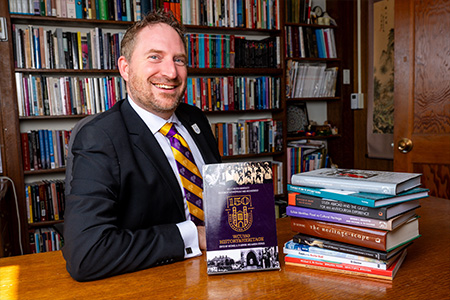
I am the author or editor of nearly a dozen books. My first monograph, The Heritage-scape: UNESCO, World Heritage and Tourism (2009) fused globalization theory, a close reading of UNESCO’s documents, and several years of ethnographic research as a tour operator with tourists in Southeast Asia to put forth a new theory of how World Heritage and tourism intersect; in 2019 this was lauded by @Via Tourism Review as one of the “most influential concepts” of the previous decade. As a dedicated teacher and museum director, I include student co-curators’ work in our exhibition catalogs; one of the most rewarding experiences was to co-edit WCU 150: History and Heritage with a former student co-curator Aaron Stoyack. I also enjoy collaborating with colleagues in editing (or co-editing) volumes and reference works that creatively and cohesively bring various voices together to offer new approaches to critical studies of heritage, pilgrimage, tourism, and foodways. Study Abroad and the Quest for an Anti-Tourism Experience, co-edited with John Bodinger de Uriarte and featuring the work of an interdisciplinary body of researchers and study abroad directors, was named “Best Tourism Books of All Time” by Bookauthority.

The Heritage-scape: UNESCO, World Heritage, and Tourism
Publisher: Rowman & Littlefield Publishers, Inc.
Pub. Date: January 2009
ISBN-13: 9780739114346 (Hardcover)
ISBN-13: 9780739114353 (Paperback)
Tourism today is recognized as the largest and fastest-growing industry in the world, capable of producing positive social and economic transformations, especially in developing countries. Yet for UNESCO, it works in conjunction with World Heritage sites for a far more ambitious
Anthropologist and former tour operator Michael Di Giovine draws on ethnographic fieldwork, close policy analysis and professional experiences in Southeast Asia and Europe to provide a detailed examination of UNESCO's unusual effort to harness globalization and cultural diversity for the purpose of creating peace. He convincingly argues that UNESCO's designations are not impotent political performances that lead to the commercialization of local monuments, but instead are the building blocks of a new social system he calls the “heritage-scape” – an imaginative re-ordering of the world that knows no geopolitical boundaries but exists in the individual "minds of men."
Written for social scientists, heritage and tourism professionals, and the educated traveler, The Heritage-scape is an insightful, detailed and expansive look at UNESCO’s World Heritage Program in Vietnam, Cambodia, and across the world.
“This is the most thorough and sophisticated examination of the UNESCO heritage system to date. [Di Giovine’s] knowledge of the heritage-making process is encyclopedic and critical. This is a book to be enjoyed for its timeliness, its revealing anecdotes, and its attention to contemporary social theory.” - Nelson Graburn, University of California-Berkeley
Debates continue to rage about the economic, political, and socio-cultural significance attached to, and conferred by, the UNESCO designation of "World Heritage." What Michael Di Giovine achieves in this important book, through detailed research and critical theoretical reflection, is grounding these debates in a comprehensive and compelling examination of the motivations, processes, networks, and people which not only shape the meanings of the past but which also project into the future. … This is clearly an essential book for all interested in the relationships and meanings which lie behind, and are generated by, the notion of World Heritage.” - Mike Robinson, University of Birmingham
“The Heritage-scape: UNESCO, World Heritage and Tourism is a valuable compendium and very useful for those like ourselves who have worked near or in relation to World Heritage Sites. The book is worth bringing to people's attention.” - James Fernandez, University of Chicago
The book opens challenging new opportunities to look at heritage and tourism markets.
… Michael A. Di Giovine’s refreshing insights into the heritage of humankind could
enhance a new form of dialogue between conservation specialists, tour operators and
anthropologists and give impetus to debates about different cultures and conservation
schools. Such a debate could also be a contribution to intercultural dialogue.
- Mechtild Rossler, Chief of Section (Europe), UNESCO World Heritage Centre
Original and innovative ... [and containing] rich ethnographic detail ... The Heritage-scape is an important contribution to the discussion on the production of narratives and material culture of “modernity”—defined through a normative experience of the past and a strategic structuring of that experience. – Journal of Tourism and Cultural Change
This is an important book. Di Giovine undoubtedly succeeds in this attempt to analyze UNESCO’s World Heritage program, always moving effortlessly between detailed case-study illustrations of World Heritage‑related processes at specific sites, explanation of the workings and declarations of UNESCO, and more generalized discussion of the processes and implications of this inherently globalizing endeavor. Indeed, this is an anthropological study of globalization par excellence. It is therefore an essential book for a broad readership, including academics, researchers and students in the fields of anthropology of globalization, tourism studies, cultural studies and heritage, as well as practitioners in the area of heritage tourism. Di Giovine is to be applauded for this timely and comprehensive examination of the contemporary World Heritage system. – Journal of Anthropological Research
Contesting the limited image of cultural diversity that is associated with the resurgent nationalism and homogenizing globalization symptomatic of the contemporary (post 9/11) era, Di Giovine makes a contribution to academic and professional understandings about the role of administrative culture as it relates to the global level of world heritage and tourism. - Curator: The Museum Journal
The multi-sited ethnographic accounts of world heritage sites in Southeast Asia are well-weaved with a discussion of how various players ... interact in a complex network. For a practitioner and stakeholder of a heritage site, ... the book altogether offers alternative ways of understanding the preservation/conservation practice in various aspects. - Conservation South Asia
Written for social scientists and tourism and heritage management professionals, [Di Giovine's] volume certainly offers a significant contribution to the debate surrounding the relationships and meanings of "world heritage," as well as to our understanding of the processes of managing, evaluating, and promoting the sites that make up the "UNESCO system," that reconfigure the testimony made by the past into indispensable resources for imagining and constructing a peaceful, future world order. - Ambiente, Societa', Territorio
The Heritage-scape is the most penetrating analysis of World Heritage to date and a thoughtful critical contribution to the grounding of heritage debates. … The examples are well selected and analysed in depth to examine the heritage- making process from almost all points of view. This gives rise to a deep text that is clear, comprehensive and full of suggestive ideas. It is incisive in its critical examinations, and offers various rich levels of readings that will surely encourage new approaches and studies of heritage in the broadest sense. It is definitely an essential book for anyone involved in heritage studies and/or cultural geography. - Cultural Geographies
This book is a substantial monograph concerned with the interface between heritage and tourism. ... An innovative ethnography, Di Giovine's work is successful in bringing to the fore the contingent, negotiated, and at times marginalising nature of World Heritage and mass tourism that happens in World Heritage sites in Southeast Asia. Of significance is his observation of the work of UNESCO beyond a designatory or list‑making regime, and as a global ordering and placemaking process aimed at creating a peaceful transnational utopia. … All in all, this is an exciting contribution to the field of heritage and tourism studies. - Journal of Heritage Tourism
Across a range of disciplines, we are now awash in -scapes. Michael Di Giovine (2009) analyzes the heritage-scape that UNESCO has created, deploying the term in hyphenated form with the full weight of Appadurai’s disentanglement of globalization. He asserts, correctly, that UNESCO is engaged in an “ambitious placemaking strategy designed to rearrange the geopolitical landscape into a reconceptualization of the world. The heritage-scape is a real social structure which creates real material effects on a globally distributed population in accordance with UNESCO’s long-term goals” (2009: 6). This apprehension becomes a new point of departure in cultural heritage studies. – Helaine Silverman, Encyclopedia of Global Archaeology
Related Content
The Heritage-scape: Origins, Theoretical Interventions and Critical Reception of a Model for Understanding UNESCO’s World Heritage Program. Via@ Tourism Review, 2017.
Keynote address: “Technological Innovation: Potential or Pariah for Sustainable Heritage Tourism.” 40th Plenary Session of the United Nations World Tourism Organization, Hamadan, Iran, 12-14 November 2018. https://www.youtube.com/watch?v=KAaTWnXSopk&t=15s
Related Press
WBEZ Chicago Public Radio / Worldview with Jerome MacDonnell. The Politics and Logistics of a World Heritage designation
ABC News (Australia) / Rear Vision with Keri Philips. World Heritage—Too much of a good thing?
Justin McClain. “Notre Dame and the Museumification of Faith.” National Catholic Register, April 29, 2019.
Lan Anh. Chuyên gia Đại học Chicago (Mỹ) trao đổi về Unesco và Di sản thế giới [University of Chicago expert (USA) discusses UNESCO and World Heritage sites. Quang Ninh Dien Tu, Travel section. December 11, 2011.
WBEZ Chicago Public Radio’s “Worldview” with Jerome MacDonnell. Israel Drops Ties With UNESCO after New Jerusalem Holy Sites Resolution.

Tourism and the Power of Otherness: Seductions of Difference
Publisher: Channel View Publications
Pub. Date: January 2014
ISBN-13: 978-1845414160 (Hardback)
ISBN-13: 978-1845414153 (paperback)
Channel View Publications Amazon
This book explores the paradoxes of Self–Other relations in the field of tourism. It particularly focuses on the 'power' of different forms of 'Otherness' to seduce and to disrupt, and, eventually, also to renew the social and cosmological orders of 'modern' culture and everyday life. Drawing on a series of ethnographic case studies, the contributors investigate the production, socialisation and symbolic encompassment of different 'Others' as a political and also an economic resource to govern social life in the present. The volume provides a comparative inductive study on the modernist philosophical concepts of time, 'Otherness', and the self in practice, and relates it to contemporary tourism and mobility.
This is a remarkable book. On first appearance, it appears to be a thin and light tome, but as you read into the chapters you come to realize that the depth and the complexity goes much further than you would have at first imagined. The concerns which are raised here are about the really important issues which should inform a deeper understanding of the touristic experiences. - Anatolia
Tourism and the Power of Otherness’ is an intriguing collection, strong in terms of both theory and ethnography, and quite enjoyable to read. Picard and Di Giovine have brought together a diverse array of European scholars who provide fresh insight into a question of enduring importance: how tourism stages the encounter between the familiar and the strange. - Sally Ann Ness, University of California
The experience of the tourist is frequently evoked, yet it remains conceptually elusive. This volume approaches the subject with a masterful perusal of the philosophical and anthropological underpinnings, exploring the crucial relationship between Otherness and Self. The reader is led to consider how this relationship underlies every successful tourist enterprise. - Elvi Whittaker, University of British Columbia
Tourism and the Power of Otherness: Seductions of Difference is an excellent source for scholars new to the ‘otherness’ debate as its structure is easily accessible with clear linkages between theory, praxis, and well-researched ethnographic evidence.” This text is also a great resource for those wanting empirical ethnographic evidence, albeit mainly in the European context, which helps to untangle the complex relationship between host and guest in their eternal quest for a realized Eden as a tourism destination.” - Tourism: An International, Interdisciplinary Journal
The book captures the attention of the reader and should be welcomed primarily in academia circles, but also in the tourism sector. – Annals of Tourism Research
The quality of presented articles varies, some of them are more general, some of them are more equipped with the theoretical back-up, others concentrate more on the autobiographic reflections. This diversity constitutes the strength of the volume. All of the papers, thanks to the accessible language and the vividness of examples, offer a pleasurable reading, which provokes a fresh view into old questions. – Via@
I heartily recommend the book to senior undergraduates and graduate students who study anthropology of tourism. I believe that the book allows readers to share a sense of the power of Otherness that extends beyond the realms of prevailing language in many tourism textbooks, which often merely validates the tourist-host encounters. By drawing on the language and theories of anthropology, it encourages all of us to attend to and work through difference, so as to make a difference. – Tourist Studies
The volume provides a comparative inductive study on the modernist philosophical concepts of time, 'Otherness', and the self in practice, and relates it to contemporary tourism and mobility. – International Association of Languages and Intercultural Communication
This is a fascinating volume, one that succeeds in showing that although pilgrimage and tourism may seem quite different, similar forces are at work in both. – International Journal of Religious Tourism and Pilgrimage
Tourism creates the paradox where order is promised but is temporarily suspended, and each of the contributors to Tourism and the Power of Otherness touch upon various ways in which the seductive allure of finding the Other has been examined. – Annals of Leisure Research
In the past couple of years, an exciting, stimulating and fresh new field has emerged in tourism studies, mostly in tourism anthropology, about the role of emotions, everyday existence and experience in tourism. David Picard and Michael di Giovine’s edited book is, without doubt, an important contribution to this trend. – Journal of Tourism and Cultural Change
The book is best described as an introduction in the use of the anthropology lens to explore tourism, and could prove useful to readers who want to start to explore tourism from a different perspective. – Journal of Tourism Futures
Omawiana publikacja jest z pewnością dobrym wyborem dla wszystkich, którzy chcą dostrzec w turystyce fenomen nie tylko ekonomiczny. Książkę można traktować jako świetną pomoc naukową (przejrzysty układ graficzny, liczne ilustracje, przypisy oraz indeks), aczkolwiek jej „przyjazny” format zachęca do lektury nie tylko profesjonalistów, lecz także osoby, które same podróżują i chcą po prostu być bardziej świadomymi turystami.
[The publication in question is certainly a good choice for all those who want to see tourism as a phenomenon that is not only economic. The book can be treated as a great scientific aid (clear layout, numerous illustrations, footnotes and an index), although its "friendly" format encourages reading not only by professionals, but also by people who travel themselves and simply want to be more aware tourists.] - Turystyka Kulturowa [Cultural Tourism]
Tourism and the Power of Otherness is an insightful book, comprising a range of chapters that offer a very welcome variety both geographically and historically. The book effectively seduces, educates and seducates us into identifying and conceptualizing the various imaginaries and ideas of Otherness related to the fields of tourism, hospitality and mobilities. – Hospitality and Society
Related Press
Ariel Sophia Bardi, “Mass Tourism: Bad for Culture but Good for Women?” PassBlue: Independent Coverage of the UN. June 13, 2017.
Interview, “Passing Time with Dr. Rob,” with Chester County Historical Society President Rob Lukens, WCHE 1520 a.m., October 29, 2014.

The Seductions of Pilgrimage: Sacred Journeys Afar and Astray in the Western Religious Tradition
Publisher: Routledge
Pub. Date: October 2015
ISBN-13: 9781472440075 (Hardcover)
ISBN-13: 9781138546301 (Paperback)
The Seductions of Pilgrimage explores the simultaneously attractive and repellent, beguiling and alluring forms of seduction in pilgrimage. It focuses on the varied discursive, imaginative, and practical mechanisms of seduction that draw individual pilgrims to a pilgrimage site; the objects, places, and paradigms that pilgrims leave behind as they embark on their hyper-meaningful travel experience; and the often-unforeseen elements that lead pilgrims off their desired course. Presenting the first comprehensive study of the role of seduction on individual pilgrims in the study of pilgrimage and tourism, it will appeal to scholars of anthropology, cultural geography, tourism, heritage, and religious studies.
This captivating collection of essays addresses an important contemporary challenge for the anthropology of pilgrimage. Through ethnographically rich chapters this book demonstrates the central role of seduction in the experience of contemporary pilgrims. - Anna Fedele, CRIA-University Institute of Lisbon
The contributions in The Seductions of Pilgrimage contain a wealth of detail about the ways the modalities of early religious pilgrimage spill over into contemporary tourist experience. Collectively they shed a bright light on the religious roots of assumptions about the seductive and transformative powers of travel. The introduction by Di Giovine and Picard establishes a strong rationale for incorporating analysis of seduction in religious and tourism studies. - Dean MacCannell, University of California
Historical commentaries and fieldwork-derived insights on the sensory delights, dangers, digressions and paradoxes of pilgrimage frame this alluring volume, which tempts us to reconsider the meanings, attractions and multi-functionality of pilgrimage in the twenty-first century. Literally concentrating on the sensational, and casting fresh light on some familiar sites and scholarly apparatus in the study of pilgrimage, this important and intriguing collection contributes valuably to our evolving understanding and appreciation of pilgrimage as a complex phenomenon which practitioners and scholars alike find endlessly entrancing. - Marion Bowman, The Open University
The book will appeal not just to scholars, but also to a general readership having an interest in spiritual philosophy and pilgrimage. Even tourism policy-makers and destination management organizations in nations or markets where pilgrimage tourism is important will find this book useful. In sum, the lessons in this book can contribute to a better understanding of the roles of tangible and intangible assets in keeping the pilgrim sites attractive and relevant. - Annals of Tourism Research
A rich tapestry of contexts and perspectives on the topic. … Of special interest for those looking for some stimulating reading for their own reflections on the Pilgrimage of Justice and Peace. - The Ecumenical Review
In all, this a very worthy collection that will lead readers in a multitude of global and religious directions of potential value… – American Academy of Religion
Of the many manuscripts on pilgrimage studies I have read recently, this is undoubtedly one of the most interesting. Indeed, the topic is novel and unique – as far as I know there are no other titles that deal specifically with these two themes. The thorough introduction by co-editors Michael A. Di Giovine and David Picard was especially good, as it laid a solid foundation on the social, philosophical and theological concept of seduction that carried across the following chapters.. … The book’s main strength lies in its aim to build a social scientific theory of seduction. It not only presents different case studies, but it also tries to use them to build a broader theory – to say something larger about the world we live in. … This is the first comprehensive study of the role of seduction on individual pilgrims in the study of pilgrimage and tourism will appeal to scholars of anthropology, history, cultural studies, geography, tourism, heritage and religious studies. A great deal of effort has obviously been invested in writing this book, which I, personally, was seduced to read from the first moment I saw the title and contents. – Noga Collins-Kreiner for the Journal of Tourism and Cultural Change
Seduction as the key word of this interesting proceedings in the context of the phenomenon of pilgrimage is gaining in importance from the point of dehumanization and alienation of today's man-passenger wishful of deeper and meaningful experiences. – Tourism
As one of the supreme elements of pilgrimage, the notion of seduction brings a fresh approach to this topic. … This book deserves a recognition of scholars of anthropology, cultural geography, tourism, heritage and religious studies. It provides a view of individual experiences and divergent seductive features of pilgrimage. These elements are also valuable for tailor-made experiences of tourism and leisure sectors. – Heritage and Society
This volume consists of very interesting, well-written, and strong contributions by fine scholars in the area of pilgrimage studies. - The Journal of the Royal Anthropological Institute
Related Content
Of Saints and Serendipity. Video talk presented for the virtual symposium, “Pilgrimage in the Midst of Pandemic”, Institute for Pilgrimage Studies, College of William and Mary, January 21, 2021.
Faith in Spiritual and Heritage Tourism. Special issue of Religions, co-edited with Mohamad Sharifi-Tehrani. 2021.
Related Press
Sarah Laskow. “Miracle Towns: Where Plastic Junk Becomes Holy Relics”. Atlas Obscura, September 23, 2015.
Tom Gardener, “Gospel Truths: A Symbolic Struggle over Ancient Manuscripts”. The Economist. March 24, 2018, pp. 75-76.
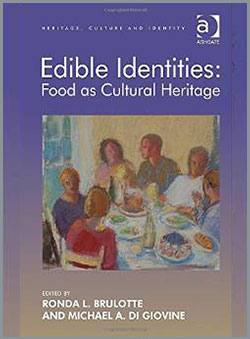
Edible Identities: Food as Cultural Heritage
Publisher: Routledge
Pub. Date: December 2016
ISBN-13: 978-1409442639 (Hardcover)
ISBN-13: 978-1138634947 (Paperback)
Food - its cultivation, preparation and communal consumption - has long been considered a form of cultural heritage. A dynamic, living product, food creates social bonds as it simultaneously marks off and maintains cultural difference. In bringing together anthropologists, historians and other scholars of food and heritage, this volume closely examines the ways in which the cultivation, preparation, and consumption of food is used to create identity claims of 'cultural heritage' on local, regional, national and international scales. Contributors explore a range of themes, including how food is used to mark insiders and outsiders within an ethnic group; how the same food's meanings change within a particular society based on class, gender or taste; and how traditions are 'invented' for the revitalization of a community during periods of cultural pressure. Featuring case studies from Europe, Asia and the Americas, this timely volume also addresses the complex processes of classifying, designating, and valorizing food as 'terroir,' 'slow food,' or as intangible cultural heritage through UNESCO. By effectively analyzing food and foodways through the perspectives of critical heritage studies, this collection productively brings two overlapping but frequently separate theoretical frameworks into conversation.
"How can something as perishable as food become a concrete connection with the past? This imaginative and sophisticated collection of case studies shows us how cuisines can both unite and divide people, connecting daily routine meals with lofty ideals of nationality and global citizenship. It is full of convincing evidence that communities are not just imagined, they are also eaten." - Richard Wilk, Indiana University
This is an excellent book. For those with an interest in food, heritage and tourism (separately and combined), it is a valuable academic text; for everyone else, it is still valuable as an important read. ... The book comprises an introduction by the authors and then 14 case studies from different parts of the world: one from Asia, two from South America, three from North America and seven from Europe, as well as a chapter looking at the work of UNESCO. ... What I really liked about the book was the passion and insight exhibited within each of the chapters. - Journal of Heritage Tourism
Edible Identities makes a valuable contribution to tourism studies, food studies, anthropology, history, and cultural studies and will certainly appeal to academics, activists, and lay-audiences alike. - Food and Foodways
I highly recommend this volume for classroom use and beyond. It is a significant contribution to scholarship in cultural studies, history, political science, anthropology, folklore, food studies, and any other field concerned with the state of the world today. It is an admirable and useful demonstration of the observation made by the editors that "Through the materiality of ethnic food and food-based experiences, complex, difficult-to-articulate problems and prejudices can find expression" (p. 9)." - Lucy M. Long, Center for Food and Culture, for the Journal of Anthropological Research
"This volume lays the groundwork for understanding the symbolic, economic, and political importance of food as a form of cultural heritage and provides an in-road for researchers seeking to use food as method for asking complicated questions about identity, crisis, and globalization." - Graduate Journal of Food Studies
This path-breaking collection examines cuisine and cultural heritage as they create and reinforce culinary identities across shifting planes of local, national, and transnational contexts. The essays, by leading specialists in food studies as well as by young scholars, focus on the US, Italy, Japan, Mexico, Slovenia, Spain, France, and Germany, as well as on UNESCO’s role in promoting cultural heritage movements. An appetizing world tour of culinary heritage, and a must-read for serious food specialists. - Ted Bestor, Harvard University
The unifying thread throughout the book is the paramount importance of preserving food as cultural heritage and as ancestral knowledge as a representation of the maintenance and restoration of physical, cultural, and spiritual well-being. When food rituals are properly performed, they unite us with our heritage, our community, and our planet. - Annals of Tourism Research
"This collection of essays brings together important issues of identity, ethnicity, and food culture, with many of the contributions contextualized in the light of global food tourism, cultural heritage, processes of ‘heritagization’, and questions of authenticity. From the outset, Di Giovine and Brulotte coherently and insightfully consider the fluid relationship between food and the development of ethnic identities, unpacking the role of the often discussed UNESCO ‘List’ of foods and culinary practices. Here there is consideration of the relationship between ‘Intangible Cultural Heritage’, local economies, global markets, and the (re)making or (re)invention of distinctive foodways." - Folklore
Through compelling ethnographies that embark readers on a captivating journey around the world of gastronomical heritage (re)production … [and] by debunking founding myths, the book produces a deeper understanding of foodscapes as complex nodes that bridge place and culture, past and future, nostalgia and progress, and where the nature-culture relationship is articulated and history gets appropriated through the redefinition of insideness boundaries in which heritage labels become signifiers and food becomes spectacle. - Gastronomica
This collection of thoughtful and well-written essays … successfully achieves the authors’ goal of articulating food practice and its role in heritage more deeply than categories and labels. These localized examinations of the complicated interactions involved in the production, culinary processes, eating and, yes, consumerization of food provide new insights into the true complexity of examining and defining “food as cultural heritage.” – Journal of Folklore Research
Edible Identities: Food as Cultural Heritage is a must-read for all who engage in the politics of identity formation and would be of especial interest for scholars in critical heritage studies and cultural studies. – International Journal of Intangible Heritage
The value of this book is its ability to stimulate discussion and introduce the reader to different perspectives on food as cultural heritage. ... The book is well written and edited, and can be a good addition to a library. – Journal of Tourism and Cultural Change
This book is highly recommended for scholars in the social sciences and the humanities interested in the politics of food, identity and cultural heritage, especially in relation to local, regional, and national politics. Furthermore, its broad geographical focus makes it an ideal volume to include in introductory and advanced university courses. … This collection of essays reveals that there is more than meets the eye when it comes to food, authenticity, and identity. …[It] successfully provides a context in which to understand how the “macdonalization” and “extreme localisms” throughout the world are giving rise to novel and creative strategies to construct and transform “edible identities”. – AllegroLab: Anthropology, Law, Art and World – Special Book Symposium featuring Edible Identities
The volume’s strengths lie in its bringing together of various heritage discourses around food and how these are each implicated in wider circles of affirmations and contestations. - Julie Boticello, University of East London, AllegroLab: Anthropology, Law, Art and World – Special Book Symposium featuring Edible Identities
I found Brulotte and Di Giovine’s book to be an exciting journey into the realm of food and heritage, politics and practices, identity and rebellion in the face of change through immigration, commodification and globalization. … I highly recommend this book for anyone interested in understanding the relationship between tradition, as a part of authenticity, and innovation, as a requisite for market differentiation, as well as the nature of constructed identity as it relates to local/global food and/or heritage tourism studies. - Hospitality and Society
An excellent balance is struck between ethnography and theoretical considerations …This book makes a timely contribution to the literature of Food Studies and the Anthropology of Food. The editors have done an excellent job. – Tourism
The volume successfully provides a context in which to understand heritage strategies used to construct “edible identities”. And perhaps more important is that it also makes clear the need for further research on food heritage-making around the world. This book is highly recommended for scholars and students of anthropology, heritage and cultural studies, and for anyone interested in the connections between food, culture, and identity. - Anthropology of Food
Brulotte und Di Giovine mit Edible Identities ein facettenreiches Buch, das mit der expliziten Diskussion des Heritage – Themas anhand detailreicher ethnografischer Fallbeispiele einen anregenden und sehr zu empfehlenden Beitrag zum Thema “Essen und Identitat” leistet.
[With Edible Identities, Brulotte and Di Giovine deliver a multifaceted book that, with its explicit discussion of the topic of heritage using detailed ethnographic case studies, makes a stimulating and highly recommended contribution to the topic of “food and identity.] - Anthropos
The essays combine to give empirical substance to the critical analysis of the politics of gastronomic authenticity...this carefully organized and cohesive volume offers a highly readable overview, food for thought, and some tasty surprises. - Michael Herzfeld, Harvard University, for the Journal of the Royal Anthropological Institute
Related Content
The Amatriciana per Amatrice Campaign: Reflections on Food, Solidarity, and the Earthquake in Central Italy. Society for Food and Nutrition blog, October 28, 2016. With Elisa Ascione.
Related Press
Allie Yang, “What is the Feast of the Seven Fishes?” National Geographic. July 26, 2023.
Mollie Lapsey. Edible Identities: A Heritage Inspired Potluck Supper. Think Global Heritage blog. October 19, 2018.
AllegroLab special forum on Edible Identities
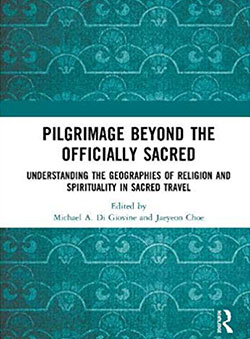
Pilgrimage beyond the Officially Sacred: Understanding the Geographies of Religion and Spirituality in Sacred Travel
Publisher: Routledge
Pub. Date: June 2021
ISBN-13: 9780367441197 (Hardcover)
ISBN-13: 9781032084077 (Paperback)
Pilgrimage beyond the Officially Sacred: Understanding the Geographies of Religion and Spirituality in Sacred Travel examines the many ways in which pilgrimage engages with sacredness, delving beyond the officially recognized, and often religiously conceived, pilgrimage sites.
As scholarship examining the lived experiences of pilgrims and tourists has demonstrated, pilgrimage need not be religious in nature, nor be officially sanctioned; rather, they can be 'hyper-meaningful' voyages, set apart from the everyday profane life―in a word, they are sacred. Separating the social category of 'religion' from the 'sacred,' this volume brings together a multidisciplinary group of scholars employing perspectives from anthropology, geography, sociology, religious studies, theology, and interdisciplinary tourism studies to theorize sacredness, its variability, and the ways in which it is officially recognized or condemned by power brokers. Rich in case studies from sacred centers throughout the world, the contributions pay close attention to the ways in which pilgrims, central authorities, site managers, locals, and other stakeholders on the ground appropriate, negotiate, shape, contest, or circumvent the powerful forces of the sacred. Delving ‘beyond the officially sacred,’ this collective examination of pilgrimages―both well-established and new, religious, and secular, authorized and not―presents a compelling look at the interplay of secular powers and the transcendent forces of the sacred at these hyper-meaningful sites.
Providing a blueprint for how work in the anthropology and geography of religion, and the fields of pilgrimage and religious tourism, may move forward, Pilgrimage beyond the Officially Sacred will be of great interest to an interdisciplinary field of scholars. The chapters were originally published as a special issue in Tourism Geographies.
I was so excited to see this book and its compilation of chapters because it’s always really interesting in pilgrimage studies to see how these thematic areas are emerging and how people conceptualize the work of such a variety of scholars and different professional disciplines. – Heather Warfield, Meaningful Journeys
Related Content
Imagined Israel: The Problem of Pilgrimage in the Holy Land. Marginalia: LA Times Review of Books. April 9, 2017.
The Coronavirus Crisis in a Shiite Society: Faith and the Experience of a Pilgrimage Ban at Iran’s Central Shrine. Religions. 13:874.
Related Press
“Pilgrimage beyond the Officially Sacred” Meaningful Journeys podcast with Heather Warfield, July 30, 2020.
“Wellness and Spiritual Tourism after COVID-19.” Anthropology of Tourism Interest Group blog. July 4, 2020.
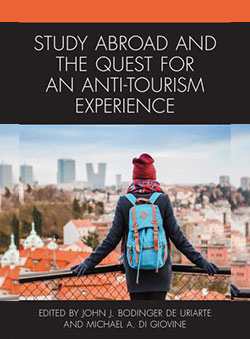
Study Abroad and the Quest for an Anti Tourism experience
Publisher: Rowman and Littlefield
Pub. Date: December 2020
ISBN-13: 9781498583268 (Hardcover)
With contributions from anthropologists and cultural theorists, Study Abroad and the Quest for an Anti-Tourism Experience examines the culture and cultural implications of student travel. Drawing on rich case studies from the Arctic to Africa, Asia to the Americas, this impressive array of experts focuses on the challenges and ethical implications of student engagement, service and volunteering, immersion, research in the field, local community engagement, and crafting a new generation of active, engaged global citizens. This volume is a must-read for students, practitioners, and scholars.
As this volume was going to press in early 2020, the COVID-19 pandemic offered a disturbing, yet valuable, pause to re-assess the promises of study abroad and its sustainability. In light of the sudden cancellation and refashioning of study abroad programs, the editors took the opportunity to analyze the effects of the novel coronavirus pandemic on study abroad and its gradual “reopening”. The book’s epilogue, based on interviews with the contributors, is likely the first published work analyzing COVID-19’s effects on study abroad. It is not only prescient, but an important historical document for how study abroad was being conceived of and how changes were beginning to be formed.
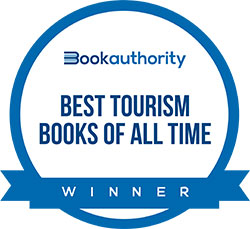
This volume is a wonderful, comprehensive compendium of study-abroad assemblages. It is a most intensive read, simply because the reader travels with cultural texts all over the world, all at once, discovering the practices and discourses of study-abroad....The rendering of how the study-abroad performance is balanced, enacted and reproduced makes this book an invaluable resource for understanding the culture of study-abroad, and provides a unique glimpse into a rite de passage of the American university. - Journal of Tourism and Cultural Change
This book is an innovative text contrasting tourism and anti-tourism in subtle and unexpected ways. It was a mind-blowing book for me! - Edward M. Bruner, University of Illinois
This timely volume, grounded in anthropology and cultural studies, takes readers on a quest to better understand the unique promises of education abroad against the structures and imaginaries of tourism. As the COVID-19 pandemic propels us into a new era of higher education, this volume will be useful to those eager to reshape the next generation of education abroad. – Anthony C. Ogden, University of Wyoming
"This is an excellent, thought-provoking book that challenged and broadened my own thinking about tourism and study abroad in many productive ways. This book should be considered essential reading for study abroad directors at all institutions of higher learning, and it should be kept within arm’s length of anyone designing and leading a study away program." – Transfers
This volume is highly recommended for international education professionals and faculty program leaders. - Frontiers
(This edited collection) draws on a range of abstract and complex concepts but does so in an assured and clear way. It makes the complex simple, but never simplistic. . . Conceptually it draws on themes from anthropology and the interdisciplinary field of tourism studies and publications on service learning and study abroad. As such, the book . . . (will) be a significant addition to the literature. - Jim Butcher, Canterbury Christ Church University
“This volume is a must-read for students, practitioners, and scholars.” - Book Authority
Related content
Read this 4-part series on study abroad, co-authored with John Bodinger de Uriarte, in NAPA Notes:
- Sustainability and Study Abroad (August 2023)
- Providing Discomfort, Pursuing Adventure, and Managing Risk in Study Abroad (January 2023)
- Ethical Considerations of Study Abroad (June 2022)
- Being there: Study Abroad in the Context of COVID-19 (March 2022)
“Offsets and the Path to Carbon Neutrality in Higher Education and Study Abroad”. West Chester University Sustainability Research and Practice Seminar. April 19, 2023.
Related Press
“Sustainable Study Abroad with Dr. Michael A. Di Giovine.” ODLI On Air Podcast, November 16, 2022.
Study Abroad and the Quest for an Anti-Tourism Experience Meaningful Journeys podcast with Heather Warfield (2021)
Teatime Chat Series Webinar (2021)
WCU Faculty Research Forum (2021)
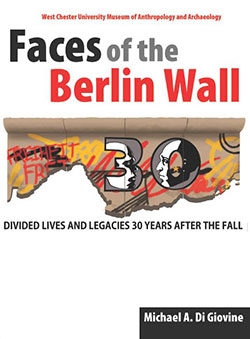
Faces of the Berlin Wall: Divided Lives and Legacies Thirty Years After the Fall
Publisher: Kendall Hunt Publishing Company
Pub. Date: October 2021
ISBN-13: 9781792440168 (Paperback)
One wall. Two sides. A city—a people—divided.
Tracing the history and development of the Berlin Wall on the occasion of the thirtieth anniversary of its fall, this book—and the West Chester University Museum of Anthropology and Archaeology’s exhibition on which it is based—examines the lives affected by this divide. With contributions from international experts and the museum’s curators, and featuring oral histories from U.S. based locals who grew up on both sides of the wall, the book engages readers to move between sectors, between realities, between and beyond the ideological divisions of east and west, socialism and capitalism, mobility and immobility. After examining the root causes of the wall, the book looks at the politics between East and West Germany, the lived experiences on both sides of the wall, and the wall’s afterlife as an icon, an imaginary, and a tourist attraction. It ends with commentary on current events and attempts to erect other anti-migrant walls. The book also features a photo-essay on abandoned Bulgarian monuments to Socialism, sponsored by the European Union. Standing in place for nearly as long as it has been down, readers can understand how the iconic Berlin Wall impacted, and continues to impact, the lives of those in Germany and throughout the world.
Related press
Interactive Model of Berlin Wall on Exhibit at WCU. Daily Local News. June 4, 2019.
Bill Rettew, WCU Students Design Museum Exhibits. Daily Local News. May 2, 2018.

The Struggle for Human Rights in Latin America 1967-2017
Publisher: West Chester University Press
Pub. Date: January 2018
ISBN-13: 9780692975985 (Paperback)
Based on the Museum of Anthropology and Archaeology’s groundbreaking exhibition, this catalog examines the struggles of various peoples of Latin America in the last fifty years, in order to shed light on the basic tenets of the Universal Declaration of Human Rights. With original artwork and arresting objects from the U.S.-Mexico Border, Chilean prisons, and the jungles of Central America, as well as Latin American archaeological and geological artifacts, the exhibition focused on indigenous land and water rights, representation through cultural heritage, border migration, narco-trafficking, political movements and their suppression, and transitional democracy. An interdisciplinary body of Latin American scholars contributed chapters to this volume, alongside contributions by student co-curators and a number of artist-activists working to raise awareness to the contemporary plight of Latin American migrants at the U.S.-Mexico borderlands.
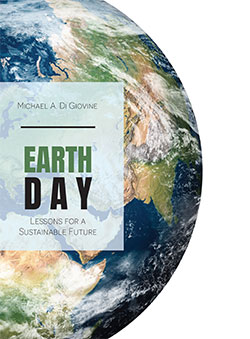
Earth Day: Lessons for a Sustainable Future
Publisher: Kendall / Hunt Publishing Company
Pub. Date: October 2023
ISBN-13: 9798385100859 (Paperback)
Earth Day: Lessons for a Sustainable Future examines the human-made environmental crisis and provides real-world examples for making our lives more sustainable. Part museum catalog and part sustainability textbook, the book presents in-depth background research conducted by faculty, staff, and students at West Chester University of Pennsylvania in preparation for the Museum of Anthropology and Archaeology’s exhibition, Earth Day at 50: Lessons for a Sustainable Future. Using the lens as Earth Day—the largest event dedicated to sensitizing the world sustainability—this book argues that the event is an empowering reminder that positive actions in daily life can combat the ongoing environmental crisis that humans have created. The first part of the book examines the history and development of Earth Day as a lens for understanding the environmental and sustainability movements. The second part discusses various topics on sustainability that were addressed in the exhibition—from climate change and sustainable energy to microplastics and illegal poaching; from Indigenous art and environmental justice to (un)sustainable foodways. With contributions from West Chester University’s Director of Sustainability, President of the Sustainability Council, and other faculty, the last part serves as a detailed case study for how the largest fully funded, comprehensive liberal arts university in the Commonwealth of Pennsylvania has negotiated social, economic, and environmental challenges in its sustainability efforts. As the exhibition spanned the pre- and post-COVID reality, the final chapter provides a first-person look at the Museum’s experiences in mounting a large, public exhibition amid in a global pandemic—a valuable resource for museum and sustainability professionals.
Related content
Earth Day at 50: Sustainability and Exhibition Planning in a Time of Pandemic. WCU Sustainability Research Seminar, West Chester University, April 22, 2020. [co-presented with students Natalie Fenner, Tyler C. Haney, Foster W. Krupp, Ben Popp, Melina Schauerman].
Offsets and the Path to Carbon Neutrality in Higher Education and Study Abroad. West Chester University Sustainability Research and Practice Seminar. April 19, 2023.
Related press
Emma Bickerstaffe The Making of an Exhibit. The Quad, February 3, 2020.
Bill Rettew. Earth Day a colorful event in West Chester. Daily Local News. April 22, 2021.
Anthropology Museum’s ‘Earth Day at 50’ Exhibit Shifts to Fall. West Chester University website. April 29, 2020.
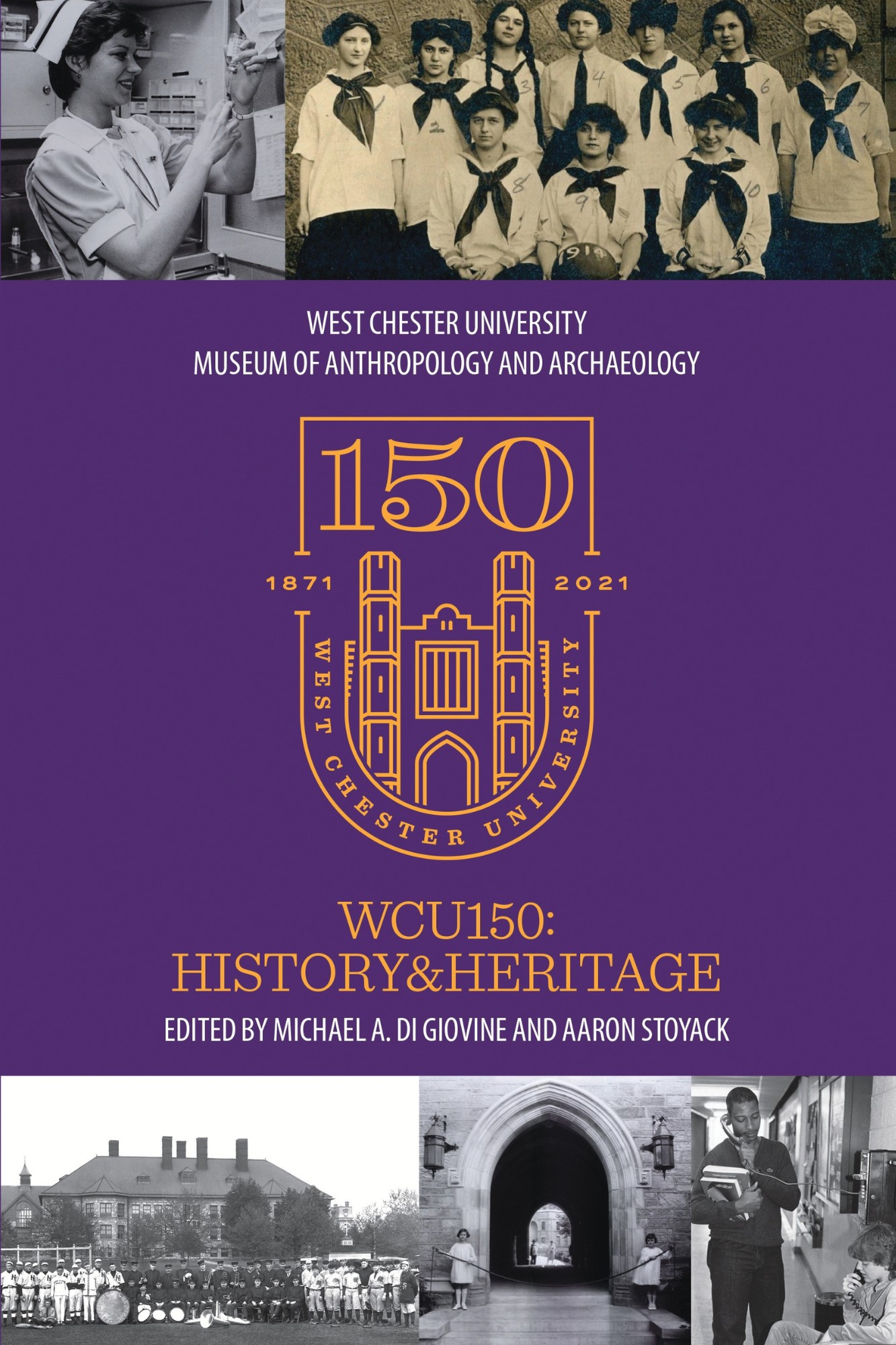
WCU 150: History and Heritage
Publisher: Innovative Ink / Kendall Hunt Publishing Company
Pub. Date: October 2024
ISBN-13: 9798385100934 (Paperback)
ses·qui·cen·ten·ni·al/ seskwəsen-tenēəl/(adjective)
relating to the one-hundred-and-fiftieth anniversary of a significant event.
The 2021-2022 academic year marked West Chester University’s Sesquicentennial Anniversary. As the largest liberal arts university in the Commonwealth of Pennsylvania, the sesquicentennial provided the opportunity to pause and reflect on 150 years of excellence in scholarship, community, and academic engagement. Based on the West Chester University Museum of Anthropology and Archaeology’s exhibition, WCU 150: History and Heritage—a centerpiece of the institution’s sesquicentennial celebrations—this volume explores the university’s rich history—from its origins as a public Normal School forming elementary teachers, to a state teacher’s college in the roaring 20s, to what the Philadelphia Inquirer called “arguably the most successful” of Pennsylvania’s state schools. Compelling articles written by faculty, alumni, and student cocurators examine topics such as teaching and learning, student life, the arts, gender and sexuality, sports, military service, diversity and inclusion, and more. As the exhibition was planned, installed and exhibited during the COVID-19 pandemic, the volume also provides insight into how higher education and the culture industry dealt with a global crisis. Illustrated with over a hundred photos of rare artifacts from the exhibition, and containing original research and first-hand accounts of life at WCU, West Chester University’s heritage comes to life in this important volume, providing a compelling case study of the life history and development of a major university.
A 3D virtual experience complements this volume: www.wcupa.edu/WCU150VirtualExhibition
"Boasting artifacts from around the world that date back to 1871, the exhibition tells
the story of the extraordinary people and significant events that have shaped the
University into what it is today, the largest university within Pennsylvania’s State
System of Higher Education."
Daily Local News
"A special exhibit that brings together valuable artifacts from around the world in
1871, putting West Chester into greater perspective. The exhibition does not shy away
from addressing historical struggles with race, gender, sexuality, equity and inclusion,
and presents the people and events that have shaped the university into what it is
today."
Chadds Ford Neighbors
"West Chester University’s rich 150-year legacy is highlighted in a unique museum
exhibit… The exhibit speaks to understanding the past and making the future better."
ABC News
Related content
Making WCU’s 150 Exhibition and Special Collections Tour. Thematic Tour and Lecture Series November 18, 2021.
A Virtual Walking Tour of the University’s Sculpture Collection. Thematic Tour and Lecture Series April 14, 2022.
Related press
MacAlpine, Loretta. Anthropology Museum's Book on WCU's Sesquicentennial Is Published. West Chester University news. December 11.
Johnson, Ashley. West Chester Showcases 150 Year Legacy through Museum Exhibit. 6 ABC Action News. October 8, 2021.
Emma Hogan. History and Heritage Exhibit Opening. The Quad. September 20, 2021.
Museum Examines 150 Years of History at West Chester University. Daily Local. Oct. 26, 2021.
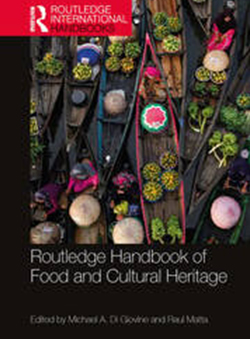
Routledge Handbook of Food and Cultural Heritage
Publisher: Taylor and Francis
Pub. Date: August 18, 2025 (coming soon)
ISBN-13: 978-1032026558 (Hardcover)
The Routledge Handbook of Food and Cultural Heritage explores the many varied intersections of food and cultural heritage from a robust, transdisciplinary perspective.
Innovative in its approach, this cutting-edge Handbook thinks beyond traditional boundaries to present unique perspectives on the myriad ways in which food and cultural heritage are entangled in theory and practice. Both are growing industries; both are deeply rooted in families, cultures, and societies; both generate controversy and are deployed for political and economic activism. They also both have intellectual lives of their own, and are centers of interdisciplinary fields themselves—yet they also intersect in interesting and, until this book, under-theorized ways. After a comprehensive introduction that presents and challenges the state-of-the-art in the disciplines of critical food and critical heritage studies, the Handbook’s chapters are divided into six themes common to both fields: Ontologies and epistemologies of food and cultural heritage; material culture; identity, placemaking and belonging; politics and regulation; tourism development and heritage management; and contemporary issues and emerging approaches. To give representation of voices not usually heard in the scholarly tradition, special interviews with food-and-heritage practitioners complement the comprehensive chapters, adding further depth to the volume through their own lived experiences.
With contributions from nearly 50 internationally recognized scholars, social scientists,
dieticians, practitioners, and activists, this book is essential reading to scholars,
students, researchers, industry professionals, and practitioners looking to understand
the complex and compelling ways in which food, foodways, and cultural heritage overlap
and impact each other, providing venues for collaborations.
In joining their expertise and their networks, Di Giovine and Matta have succeeded
in assembling an impressive, global set of contributors. The deep past of food production and consumption, material and immaterial alike,
reconfirms that food is good to think with, particularly for understanding the mushrooming
of heritage practices in realms ranging from identity and belonging to regulation
and policy.
- Regina F. Bendix, Georg-August-University, Göttingen, Germany
This fascinating and comprehensive volume explores myriad ways that food and
cultural heritage intertwine in constructing meaning, place, and power. Contributors
from across the social sciences show the explanatory potential of culinary heritage
by examining its role in empirical case studies of migration, nation-building, terroir,
tourism, restaurant and domestic cooking, museums, and activism.
- Carole Counihan, co-editor of Chefs, Restaurants and Culinary Sustainability
This groundbreaking handbook offers a rich, multi-dimensional exploration
of how food, in both its everyday and institutionalized forms, profoundly influences
our identities, rooting us in particular places and histories.
- Ronda L. Brulotte, University of New Mexico
Tackling the social, economic, legal, and cultural Implications of food-as
heritage, this volume offers a nuanced, multidisciplinary perspective on how caring
about and transmitting foodways along with agropastoral and agricultural traditions
is a crucial concern in today’s social movements and policy debates globally.
- Chiara Bortolotto, Centre National de Recherche Scientifique (CNRS)
Organized around productive themes in critical heritage studies and food studies,
this collection authored by more than 50 scholars worldwide, will become a text to
structure our thinking and argue with. It is a robust collection of empirically rich
and theoretically generative essays that are good to think with.
- Krishnendu Ray, Director of the Doctoral Program in Food Studies at NYU
